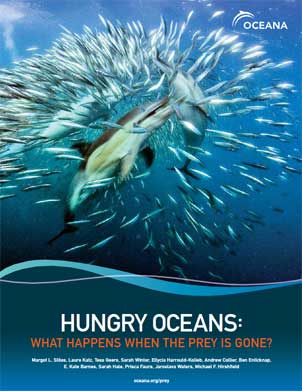Report | April 28, 2010
Hungry oceans. What happens when the prey is gone?
According to conventional wisdom, small, fast-growing fish are impossible to overfish because their populations are so large and grow so quickly. Yet we are now seeing disquieting signs that conventional wisdom is wrong.
Most significantly, scientists are reporting ocean predators emaciated from lack of food, vulnerable to disease and without enough energy to reproduce. Scrawny predators—dolphins, striped bass, and even whales—have turned up along coastlines around the world. Recreational fishermen are losing both their target fish—and their bait. Fishing communities are losing their livelihoods.
Because we have overlooked hungry predators, we have allowed overfishing of their prey, causing food shortages in the ocean. In addition, by fishing where and when they are breeding, we are driving prey populations to the brink of disaster, and in some cases beyond it.
At the same time, our continued demand for salmon, tuna, and other large predators has driven explosive growth in aquaculture. Rather than relieving pressure on wild fish, growing these large carnivores requires a steady supply of prey that are caught and ground into oil and meal. As the industry grows, it is straining the existing supply of prey fish, putting additional pressure on populations that cannot supply the demand.
Because populations of many small prey species are sensitive to changes in temperature, ocean currents, and El Niño, they are particularly vulnerable to climate change. For predators, even small climate-driven shifts in the local availability of squid and other prey during breeding can lead to malnourished young or abandonment.
For many prey species, humans have replaced their natural predators—the other fish, the sea birds, the marine mammals—all the species that depend on them for their existence. Fishermen who catch prey species are beginning to turn up empty nets. Unless the current trends are reversed, we can look forward to a future with increasingly hungry oceans.


